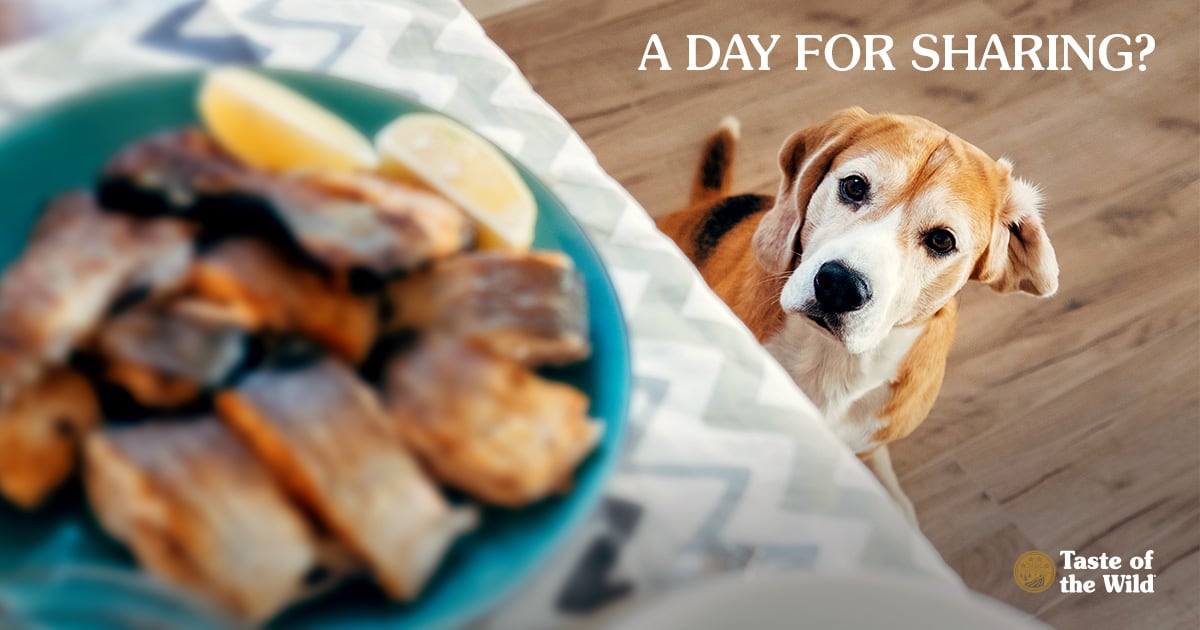
The holiday dedicated to overeating is upon us. So who can blame you for wanting to indulge your furry family members when feeding your own face?
For many people, moderation is the only thing off the table on Thanksgiving. But there are good reasons why you should be a little more careful with your pets.
First, any abrupt change in your pet’s diet can lead to tummy upset, vomiting and diarrhea. And second, sharing fatty foods like turkey skins and gravy with your pet could lead to pancreatitis, a painful inflammation of the pancreas. With that in mind, it’s best to limit the different types of food items you pass under the table to no more than three. And some, of course, are safer than others. Here are Thanksgiving foods for pets that are OK to share and others that are best avoided.
What’s on the “Yes” List
Turkey: A little taste of turkey is fine, as long as you remove the skin and bones. Resist the urge to share raw or undercooked meat because, as in people, Salmonella bacteria can disrupt the digestive tract.
Potatoes: Both dogs and cats can appreciate a wee bit of cooked or mashed potatoes, yams or sweet potatoes. Ideally, prepare these separately, without butter, garlic, sour cream, bacon, marshmallows, brown sugar or other flavorings.
Vegetables: Your kids may turn their nose up at green beans or carrots, but your pets probably won’t. Raw or cooked, these vegetables are healthy to share as long as you omit the butter, mushroom soup, candied glaze or other fatty trimmings.
Fruits: You’d be surprised at what kinds of fruits your pets will eat. If your cat or dog has a hankering for the sour, cranberries are OK in moderation. Otherwise, try sliced apples (no seeds or stems), bananas, oranges, blueberries or even kiwi. Just avoid grapes, which can be toxic to dogs.
RELATED POST: Healthy Snack Choices to Tip the Scales in Your Pet’s Favor
The “No” List — and Some Alternatives
Turkey bones: These bones can easily splinter and damage the mouth and digestive tract or lead to a blockage. Instead, consider giving your dog a Kong stuffed with a dab of peanut butter.
Stuffing: Unfortunately, most stuffing contains items that could be potentially toxic or upsetting to pets, including garlic, onions, raisins, macadamia nuts and spices. For a safer and satisfying option, serve up some plain white or brown rice.
Gravy: Again, turkey drippings are too rich and other spices should be avoided. For a little treat, try drizzling low-sodium chicken broth over your pet’s Thanksgiving meal.
Pumpkin or pecan pie: Sugar and spices make these desserts a little too rich for the average dog or cat. On the other hand, a spoonful of canned pumpkin (plain pumpkin, not the spiced pie version) may be not only a tasty treat but healthy fiber for your pet’s diet.
Of course, some pets are notorious for helping themselves to a Thanksgiving meal despite your best efforts. The Hambone Award, awarded each month by Nationwide Insurance for the most unusual pet insurance claim, is named after a dog who polished off an entire Thanksgiving ham while trapped in the refrigerator waiting to be rescued.
But the way to a pet’s heart isn’t always through his or her stomach — especially if your pet has lost that hourglass shape. So this holiday, take the time to go for a walk. Toss the ball in the backyard. Or encourage your cat to chase a laser dot across the floor. A little exercise and togetherness can be just as satisfying as food.
The information in this blog has been developed with our veterinarian and is designed to help educate pet parents. If you have questions or concerns about your pet's health or nutrition, please talk with your veterinarian.
